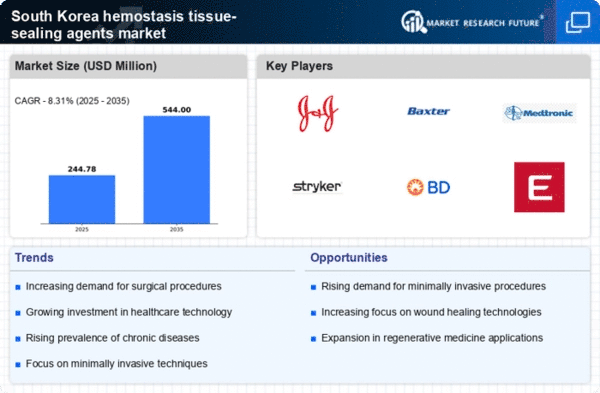Rising Surgical Procedures
The increasing number of surgical procedures in South Korea is a pivotal driver for the hemostasis tissue-sealing-agents market. As the healthcare sector expands, the demand for effective hemostatic solutions rises correspondingly. In 2025, surgical procedures are projected to increase by approximately 5% annually, leading to a heightened need for advanced tissue-sealing agents. This trend is particularly evident in areas such as orthopedic and cardiovascular surgeries, where effective hemostasis is critical. The hemostasis tissue-sealing-agents market is likely to benefit from this surge, as hospitals and surgical centers seek reliable products to minimize bleeding and enhance patient outcomes. Furthermore, the integration of these agents into standard surgical protocols may further solidify their role in modern surgical practices.
Increased Focus on Patient Safety
The growing emphasis on patient safety and quality of care is a crucial driver for the hemostasis tissue-sealing-agents market. Healthcare providers in South Korea are increasingly prioritizing products that enhance surgical outcomes and reduce complications. This focus is reflected in the rising adoption of hemostatic agents that minimize blood loss and promote faster recovery times. In 2025, it is estimated that hospitals will allocate up to 15% of their surgical budgets towards advanced hemostatic solutions. The hemostasis tissue-sealing-agents market is positioned to capitalize on this trend, as healthcare institutions seek to implement best practices that align with patient safety initiatives and regulatory standards.
Advancements in Medical Technology
Technological advancements in medical devices and surgical techniques are significantly influencing the hemostasis tissue-sealing-agents market. Innovations such as minimally invasive surgery and robotic-assisted procedures necessitate the use of advanced sealing agents that can provide effective hemostasis with minimal tissue trauma. In South Korea, the adoption of these technologies is on the rise, with a projected market growth of 7% in the next few years. This growth is likely to drive demand for hemostatic agents that are compatible with new surgical methodologies. The hemostasis tissue-sealing-agents market must adapt to these changes by developing products that meet the evolving needs of healthcare providers, ensuring that they remain at the forefront of surgical innovation.
Growing Awareness of Hemostasis Solutions
There is a notable increase in awareness regarding the benefits of hemostasis solutions among healthcare professionals in South Korea. This heightened awareness is driving demand for effective tissue-sealing agents, as surgeons and medical staff recognize the importance of managing bleeding during surgical procedures. Educational initiatives and training programs are contributing to this trend, with an estimated 20% increase in workshops focused on hemostatic techniques over the past year. The hemostasis tissue-sealing-agents market stands to gain from this growing knowledge base, as informed practitioners are more likely to adopt advanced sealing agents that enhance surgical efficiency and patient outcomes.
Regulatory Support for Innovative Products
Regulatory bodies in South Korea are increasingly supportive of innovative medical products, which is beneficial for the hemostasis tissue-sealing-agents market. Streamlined approval processes and incentives for research and development are encouraging manufacturers to introduce novel hemostatic agents. In 2025, it is anticipated that regulatory approvals for new products will increase by 10%, fostering a competitive environment that drives innovation. This regulatory landscape allows the hemostasis tissue-sealing-agents market to thrive, as companies can bring cutting-edge solutions to market more efficiently, ultimately improving surgical practices and patient care.




















Leave a Comment